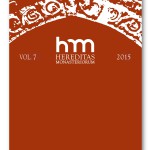Argent et autoconsommation: les crises des réguliers à l’époque preindustrielle
Marketed and consumed production: the crisis of the regular orders in early modern Europe
Author(s): Fiorenzo LandiSubject(s): History, Economy
Published by: Laboratoire de Recherches sur l'Histoire des Congregations et Ordres Religieux (LARHCOR)
Keywords: regular clergy; dualism; accumulation; collecting; confiscations; reconversion
Summary/Abstract: From the mid-17th century until the mid-19th century regular orders of Catholic Europe, with their ca. 45,000 monasteries and convents, shared the dualistic nature of a pre-industrial economic system. On the one hand there were rich and powerful orders which had their assets and income confiscated by the mid-18th century; on the other there were mendicant orders practising exchange in kind through begging. In difficult times the two groups faced different problems: the wealthy orders were deprived of their property on several occasions; the poor and mendicant orders found themselves in crisis from the early 19th century, following a change in the traditional concept of poverty. The Catholic Church adapted to the changes and, on the one hand, turned the unearned income into financial assets; on the other it changed its concept of poverty and began to fight against it by promoting professional Catholic education. In this way the collapse of the Ancien Régime offered new opportunities allowing the regular clergy to maintain large areas of economic and pastoral presence, at least until the mid-20th century.
Journal: Hereditas Monasteriorum
- Issue Year: 2015
- Issue No: 7
- Page Range: 29-43
- Page Count: 15
- Language: French

